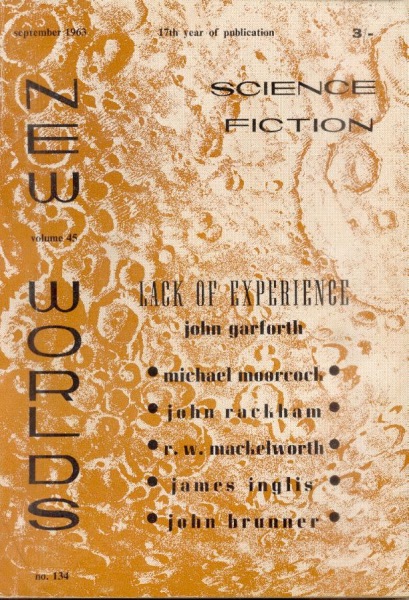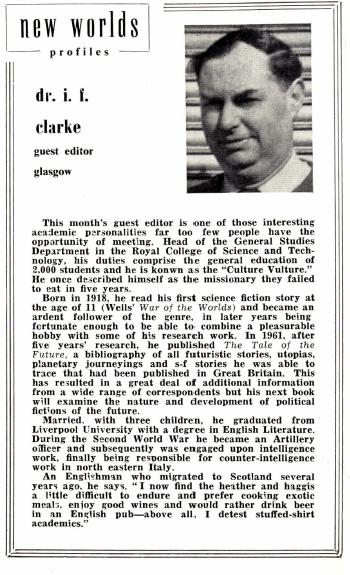
by Mark Yon
The hot summer (well, hot for England!) of 1963 now seems to be turning to things autumnal, all too soon. I have, since we last spoke, had a wonderful summer break from work, being able to rest a bit and catch up with some much-delayed reading. For the record, I have read and enjoyed Something Wicked This Way Comes by Mr. Ray Bradbury, which only came out here in Britain this year. It had a brilliantly scary evocation of evil in Mr. Dark, and will make a great Hallowe’en read. I’m usually more a fan of Mr. Bradbury’s short stories than his longer work, but I really liked this one.
On a different level of complexity, I also spent some time last week trying to decipher Mr. Anthony Burgess’ made-up polyglot language in A Clockwork Orange. Not an easy read! It’s a book that is undoubtedly clever, but seems to parade it's intelligence rather than actually focus on telling a story. I preferred the more-subtle literary tones of Mr. J.G. Ballard’s The Drowned World last year, which was easier to read, more nuanced and just as effective in my opinion.
As I type this, we’re on the way to a Worldcon, which, as ever, is something I look forward to. So, let’s have a go at some predictions. Personally, I would like Mr. Arthur C. Clarke’s to win myself, but I guess for regular readers of Galactic Journey that will not be a surprise. I haven’t read it myself, but Mr. Dick’s The Man in the High Castle seems to be well regarded, so I expect that to be a popular choice. I’d also like to see Mr. Jack Vance’s The Dragon Masters get an award – it was one of my favourites last year.
If I were a gambling person (and I’m not, usually) I would bet that the Award for Dramatic Presentation will go to The Twilight Zone, even though we’ve not seen any episodes over here in Britain. (Mind you, some of my fellow travelers have said that the latest season has been a little bit ‘hit and miss’, so you never know.)
Expect to see me with egg on my face next month when we will know how right (or wrong!) my predictions were. And now – to this month’s New Worlds.

If you remember, last month saw a number of changes to the magazine, not all of which I felt were successful. This month we have continued with the ‘generic Luna’ background, in a not so fetching shade of brown. But at least the cover font is now readable, if only to make obvious a price rise, from two-shillings and sixpence to three shillings. Either this is a sign of trying to increase income due to the increased difficulties of the magazine, or, trying to remain positive, possibly an attempt to generate more income to spend on better stories.
the ragnarok theme, by Mr. I.F. Clarke
This month’s Guest Editorial is one from an author known in British fan circles but perhaps less elsewhere. Often confused with Arthur (no relation), Mr. I.F. Clarke has been around the British s-f scene a while. His editorial is adapted from a longer version, due for publication.

Mr. Clarke looks at the current general interest in apocalyptic ‘end-of-the-world’ stories through The Ragnarok Theme. He proposes that the interest is because the idea deals with the universal myths of death and destruction in both general literature and science fiction. As Editorials go, I quite liked this one. It is different in tone from those of late, uses lots of examples to explain itself and made its main point (that a rise in interest in such themes is often related to the anxiety of the time we live in) effectively, without becoming rhetoric or rant.
Onward the stories! (and please notice, all the titles are still annoyingly written in lower case.)
lack of experience , by Mr. John Garfield
It is tempting fate, surely, to begin this month’s list with a story titled lack of experience. But, actually, this one is OK. It is, after all, a story of a bored librarian. Or rather, a bored robotic librarian, who has the intelligence to want to get out of its rut and takes a journey of discovery to find itself. This tale of frustration and loneliness could become a little mawkish, but it is made livelier with added sex. It’s not without humour, either. I did like the line one of the librarian’s colleagues gave: ”I may not have imagination….but I have flashing coloured lights.” 4 out of 5.
not by mind alone , by Mr. Michael Moorcock
This story feels like it should start with the old adage, “So, this man went to the doctors….” not by mind alone is the latest story by Mr. Michael Moorcock, who since the demise of Science Fiction Adventures seems to be spending a lot of time here in New Worlds. This time it’s the story of a physician who, when asked to examine a patient, discovers new worlds through different experiences of time, with the idea that differences in perception and understanding occur because of where a person is in his/her own space-time continuum as well as the one we all share. Much of the story is about the results of this discovery. It’s an ‘interesting idea’ sort of story, a developed thought-experiment, but ultimately seems to be little more than a not-so-disguised allegory for a drug culture. The ending is rather weak. 3 out of 5.
deep freeze , by Mr. John Rackham
Looking just at the title, I thought that this month’s story by Mr. Rackham was going to be about cryogenics. Of course, being British, I should have realised that deep freeze is actually a story about that most central of British social concerns, climate change. It is also the latest story in Mr. Rackham’s ongoing ‘X-people’ series. I’ve not been greatly enamoured with this series so far about human computers, and this one is very silly. It is the first time that I’ve ever read – or will read – a story of how modelling clay could lead to global destruction. I’m sure Mr. Ian Fleming could use this in his next James Bond novel!
Allowing for the silliness of the initial problem, the point about how easily the Gulf Stream Drift affects climate is a good one and gives this story a slightly more down-to-earth element. Allowing for my grumpiness, in the end, deep freeze is fun, if you don’t take it seriously in any way. 3 out of 5.
the rotten borough , by Mr. R.W. Mackelworth
Here’s another author returning to New Worlds. As the strapline suggests Mr. Mackelworth’s stories so far have looked at the ideas of justice and freedom. In this latest story he looks at a future British Parliament where voting is taking place to bring subliminal messaging to all. The idea that such messaging could be misused is an intriguing one, and there’s an appropriately Orwellian take on how the media can be manipulated, but the idea of having just one objector in opposition, and him because fewer people in Cornwall watch television, felt false. Another story that falls apart at the end, based on a dodgy premise to begin with. 2 out of 5.
the game , by Mr. James Inglish
As much as we readers love reading about outer space, it has been pointed out by a number of writers, such as Mr. Arthur C. Clarke, that there is much to discover on our own planet as well. the game is an interesting story in the near-future where dolphins have been trained by humans to take part in warfare, albeit explained to the dolphins as a game. The story is mainly from the perspective of Cetus, the leader of a pod of dolphins who realises that the humans may have an ulterior motive to this promised bit of fun. It’s a little let down by suggesting that dolphins can empathise to such an extent that they can experience things through other animals – in this case, an angel fish and a shark – which was a step too far for me. Nevertheless, there’s a nice moral in conclusion, if a tad dour: humans are not to be trusted. My favourite story of the issue. 4 out of 5.
to conquer chaos (Part 2 of 3) , by Mr. John Brunner
And so to the second part of our serial, which started well last month. Part Two of the story begins where we left it, in this medieval-esque environment, although there are increasing hints that the cause of the barrenland may be science-fictional. We discover more about Jervis Yanderman’s travels in the barrenlands and the consequences of the locals realising that they can communicate with outsiders. Yanderman teams up with local yokel ‘Idle Conrad’, and together they travel further towards the interior, Yanderman to determine what exists there and Conrad to seek the source of his mysterious visions (I suspect the two things are connected.) Generally it’s engaging and well written, with some nice characterisation developing beyond the clichés. One of the strongest serials of late, and I’m looking forward to next month’s final part. 4 out of 5.
trieste film festival report , by Mr John Carnell
After my barbed comments last month, Mr. Carnell has clearly been stirred to write a report on this festival. Covering a mere two pages, it’s not much, to be frank. Entitled the mystery of the ‘mare trieste’Mr. Carnell’s report is more about what didn’t happen than did. He bemoans the lack of presence of many of the guests – for example, Mr. Ray Bradbury, Mr. Frederik Pohl, Mr. Sprague de Camp and film star Mr. Ray Milland – with the British film entries being so terrible that many of the judges escaped to watch King Kong being shown in a nearby local cinema instead! Mr. Carnell lets us faithful readers know that, despite this, the British maintained a presence at the festival with himself, Mr. Harry Harrison and Mr. Brian Aldiss all doing their bit. The rest seems hardly worth reporting on.

So – another month of hits and misses in the seemingly ever-variable New Worlds. Continuing the shipping analogy, generally the good ship S.S. New Worlds seems to have stayed afloat, but only just, limping its way towards harbour once again. The good news is that this issue did seem a little more consistent, and a tad more readable, though Mr. Brunner’s serial is carrying the rest somewhat.
Until next month.

![[August 27, 1963] Ups and Downs #2 <i>New Worlds, September 1963</i>](https://i0.wp.com/galacticjourney.org/wordpress/wp-content/uploads/2018/08/630827cover.jpg?resize=409%2C372)




